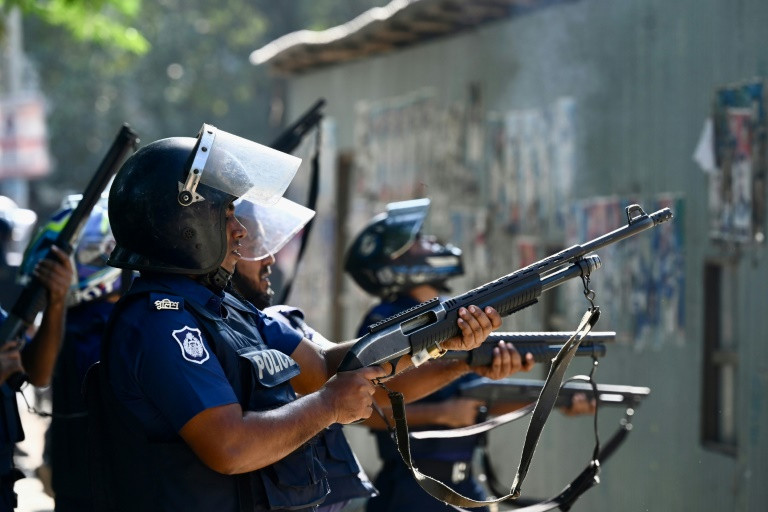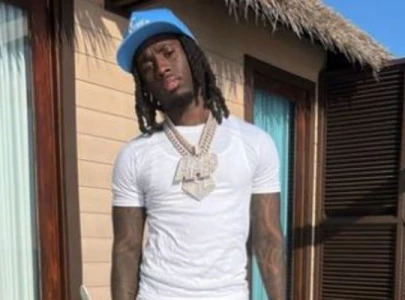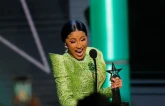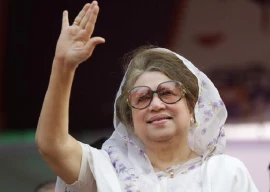
Two Bangladeshi opposition activists were killed Tuesday as police clashed with hundreds of anti-government protesters launching a three-day strike blocking roads and railways after their top leaders were charged with murder.
Police said violence broke out in multiple cities and towns as members of the Bangladesh Nationalist Party (BNP) and Jamaat-e-Islami, the country's largest Islamist party, demanded that Prime Minister Sheikh Hasina step down from power ahead of elections due by the end of January.
The BNP said it launched its transport blockade after police broke up a rally on Saturday in which more than 100,000 supporters of the two major opposition parties demanded Hasina allow a free and fair vote under a neutral government.
On Sunday, police charged BNP leader Mirza Fakhrul Islam Alamgir and more than 150 other top party members with the murder of a policeman during the demonstrations.
Police also arrested two more senior BNP leaders including the party's Dhaka chief and a former minister from the capital on Tuesday night after both were charged over the policeman's killing.
"They have been arrested," a senior police officer told AFP.
The violence has sparked international concern, with seven countries including the United States, Australia, Britain, Canada and Japan urging both sides to "exercise restraint, eschew violence and work together" for a free and fair vote.
Al Amin, deputy police chief in the town of Kuliarchar, north of the capital Dhaka, said two BNP members were killed, but that details were not clear on how they died.
Read also: Growing political schism in pre-election Bangladesh
BNP official Shariful Alam said the two were "shot dead by the police" during a rally with more than 2,000 protesters.
"Police came and opened fire -- one BNP activist died on the spot and another at a hospital," he said, adding that more than 100 were injured.
United States Ambassador Peter Haas called on all sides to hold talks in a bid to ensure "free, fair and peaceful elections", the Dhaka Tribune newspaper reported.
But PM Hasina rejected the call.
"The way they killed an innocent policeman, are they humans?" Hasina told reporters in Dhaka, referring to the death of an officer during Saturday's clashes with BNP supporters.
"Why should we hold a meeting with the killers?" she added. "Why hold dialogue? The people of Bangladesh don't want it. Does (US President Joe) Biden hold dialogue with (Donald) Trump?"
Protesters set fire to buses and clashed with security forces, hurling petrol bombs and pelting officers with rocks, police said.
Read: Bangladesh bars ill opposition leader from healthcare abroad
"They hurled Molotov cocktails and attacked and vandalised transport vehicles," police officer Mominul Islam said, adding at least 15 officers were injured. "Police fired rubber bullets and tear gas to disperse the protesters."
In the industrial city of Narayanganj, three police officers were "critically injured" by opposition protesters, said Amir Khasru, deputy district police chief.
"They were hacked with sharp weapons", he said.
The UN's High Commissioner for Human Rights also voiced "deep concern" at the violence.
"We are deeply concerned by a series of violent incidents during ongoing protests in Bangladesh," said a statement.
Alamgir, 75, the BNP's secretary-general, has led the party since BNP chairwoman and two-time former premier Khaleda Zia was arrested and jailed, and her son went into exile in Britain.
The resurgent opposition has been mounting protests against Hasina for months, despite ailing leader Zia being effectively under house arrest since her release from prison after a conviction on corruption charges.
Dhaka police said they have arrested at least 1,727 opposition activists and supporters over the last week. At least 1,544 opposition activists and leaders were also charged with violence on Saturday, police said.

1720097164-0/BeFunky-collage-(9)1720097164-0-165x106.webp)
1730446133-0/BeFunky-collage-(7)1730446133-0-165x106.webp)


1730545312-0/Express-Tribune-Web-(16)1730545312-0-270x192.webp)
1730537528-0/BeFunk_§_]-(26)1730537528-0.jpg)
1730540824-0/BeFunk_§_]-(28)1730540824-0.jpg)
1730541755-0/BeFunk_§_]-(29)1730541755-0.jpg)











COMMENTS
Comments are moderated and generally will be posted if they are on-topic and not abusive.
For more information, please see our Comments FAQ